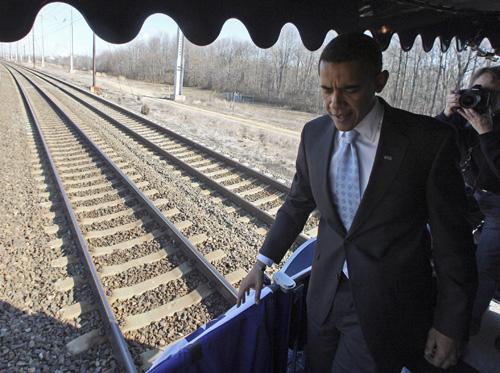Obama: the man and his moment

President-elect Barack Obama stands on the back platform of the inaugural train en route to Washington D.C. on Saturday. Chang W. Lee, The Associated Press
Jan 19, 2009
Last updated on May 13, 2016 at 06:39 p.m.
WASHINGTON – For all the banners and bunting, the hoorays and hoopla, the celebration of Barack Obama’s inauguration is imbued with meaning that extends far beyond the historic ascension of the nation’s first black president. A country mired in crisis seems to be reaching for something beyond the man or the moment.
Obama himself recognizes the importance of Tuesday’s swearing-in and a long weekend of inaugural goings-on. This is his opportunity to set what he hopes will be an enduring narrative for his new administration.
From Saturday’s whistle-stop tour carrying the president-in-waiting from Philadelphia to the nation’s capital, to Wednesday’s presidential prayer service in the soaring, gothic sanctuary of the Washington National Cathedral, Obama wants to send a clear and high-minded message: His administration will knock down barriers between government and the governed and usher in a new era for the country in a time of great tumult.
“Only a handful of times in our history has a generation been confronted with challenges so vast,” Obama said Saturday as he launched the inaugural pomp from Philadelphia’s grand-but-gritty downtown train station. He laid out the problems in stark relief: A faltering economy. Two wars. A planet warming from unsustainable dependence on oil.
Get The Daily Illini in your inbox!
As an antidote, he offered up a measure of his unfailingly hopeful resolve: “While our problems may be new,” he assured, “what is required to overcome them is not.”
As he has throughout his nearly two-year quest for the White House, Obama is infusing his inaugural celebration with references to Abraham Lincoln, so closely associated with Obama’s home state of Illinois and his race-transcending quest for the presidency. A retraced train route into the nation’s capital. A shared Bible. Even the giant limestone-and-marble Lincoln Memorial figures appearances in Obama’s inaugural festivities.
Obama’s constant linkage could have as much to do with Lincoln’s signature call for the country to choose unity over division as with his Emancipation Proclamation that ended slavery.
Black Americans seem naturally at ease with a black president who ran for office while seldom emphasizing issues of race.
“I’m pretty sure he’s going to try to help the black community,” said Lance Major, a 42-year-old student mentor who considered the promise of Obama’s presidency over a half-smoke at Ben’s Chili Bowl on a recent day in Washington. “But, you know, he can do that for us because he is not at all focused on skin color.”
In a time of extraordinary challenges, Obama’s promises of a fresh approach to leadership – not to mention his youthful demeanor and postcard-perfect family – give Americans a reason to hope.
Polls show that people have a higher level of confidence in Obama at the outset of his presidency than for any recent commander in chief – even Ronald Reagan, who also won a landslide victory during a period of economic uncertainty.
According to an Associated Press-GfK poll, 65 percent of Americans think Obama will be an above-average president or better. More than 70 percent believe the economy will improve during his first year.
For many blacks, Obama’s victory is their victory, shattering a painful racial ceiling. And for many whites, it is a bit of redemption to have said as dramatically as can be said in the United States that skin color no longer has to hold a person back.
Obama used his radio address Saturday to preview the themes of his inauguration, certain to be expounded upon in his much-anticipated speech on Tuesday.
He took particular note of the peaceful transfer of power from George W. Bush’s administration to his, a transition that saw the outgoing and incoming teams work cooperatively, often literally side-by-side, in ways never seen before.
It could be a model for the globe, Obama suggested.
“Even today billions of people around the world cannot imagine their leaders giving up power without strife or bloodshed,” he said.
Obama pledged to answer the nation’s hunger for big ideas, pointing to history as evidence.
“All Americans hold within our hands the promise of a new beginning,” he said. “Our challenges can be met if we summon the spirit that has sustained our democracy since George Washington took the first oath of office.”
If Obama’s campaign themes could be reduced to two key words – “hope” and “change” – his inauguration resonated with themes of openness and community.
At every juncture, Americans were asked to get involved, through volunteering in their own communities on the Martin Luther King Jr. holiday – as Obama and his family will do – or in some other way.
Steven R. Hurst contributed to this report





